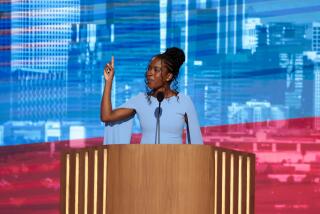A weekend of tributes to Wanda Coleman
If you want to know how much Wanda Coleman meant to the poetry community of Los Angeles, consider this: Her memorial service Sunday (called “the world’s first improvisational memorial” by her husband, Austin Straus) lasted four hours.
At times, it felt like everyone who had gathered at Santa Monica’s Church in Ocean Park would get up to speak, to read a poem, to sing a song, to honor the life of a writer, who as poet and critic Bill Mohr recalled, “always took the singular to the plural: We are literary L.A.” Even Coleman herself made an appearance, in the form of a couple of riveting video pieces; “I’m talking to me, the me that exists in my imagination,” she declared, when asked for whom she wrote.
The Sunday memorial was the second Coleman tribute of the weekend; on Saturday afternoon, in association with Red Hen Press and the Poetry Society of America, the Central Library’s ALOUD series hosted a celebration of her work.
National and local poets, including Terrance Hayes, Douglas Kearney, Suzanne Lummis and Laurel Ann Bogen, read favorite Coleman pieces: “In That Other Fantasy Where We Live Forever,” “Angel Baby Blues.”
“She did not traffic in phony uplift,” observed Stephen Kessler, and yet, this only made her, as both poet and personality, resonate all the more. “I just want to say,” Lummis noted, after reading the poem “I Live for My Car,” “people talk about Wanda’s rage, but there was a lot of love in that woman. The proof is right here in this room.”
Lummis is right: Coleman was complicated, forceful, but in every way that matters, she was motivated by love. That love could be fierce -- Hayes recalled her telling him off onstage -- but at heart it was idealistic, driven by a vision of the way things could be. “Wanda went ahead of all of us,” remembered Sesshu Foster, “and she explained a major portion of what this city is about.” Without her, he continued, “we’ll just have to pick up our game.”
This sense, that she was the trailblazer, that without her we are fundamentally diminished, resonated through both of the weekend’s memorial events, albeit in different ways. Perhaps it’s easiest to break it down by saying that one focused on her professional life and the other on her personal life -- and yet, what they really have to tell us is that there was no division between the two.
Rather, Coleman, lived it as she wrote it: sensitive, righteous, full of generosity and spirit, dedicated to building and sustaining a Los Angeles poetry community. “Remembering her makes me proud to call myself an L.A. poet,” said Cecilia Woloch at the library, a sentiment echoed so often that it became a kind of refrain.
Whether in her work or the work she admired -- participants on Sunday included a flutist who played a favorite piece by Debussy, the vaudeville act of Sharon Evans and Rick Rogers (Coleman’s sister and brother-in-law) and poet and performer Eric Priestley, who described meeting her during a 1960s production of Jean Genet’s play “The Blacks” -- what emerged was her engagement, her sense of humor, her sense of justice, the full scope of her influence.
I lost track of the poets who reflected on how Coleman had helped them, whether in terms of publications or readings, or in having them as guests on “The Poetry Connexion,” the KPFK radio show she co-hosted for many years with Straus.
It all ties into her belief in writing as the “highest form of politics,” a forum in which we reveal the truest essence of ourselves. Coleman was always about that, about unveiling herself, her city, her circumstance, about saying what no one else was willing, or able, to say.
“I expect my ashes to be scattered like pollen,” she once wrote, and over the weekend, downtown and in Santa Monica, one could see the outcome: a writing community in which, thanks to Coleman, a thousand flowers bloom.
ALSO:
Nikki Giovanni mixes it up in ‘Chasing Utopia’
Harryette Mullen walks Los Angeles into verse








